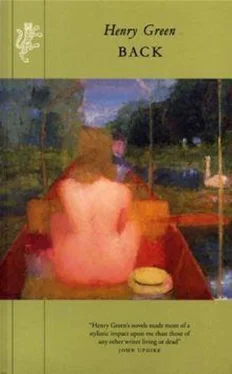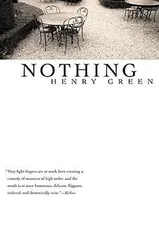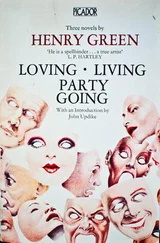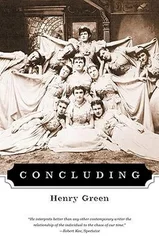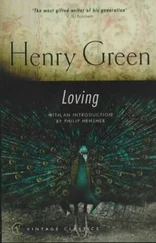He rushed off so he should hear no more, and in trying to go fast he limped exaggeratedly. Rose that he’d loved, and who could not be explained.
“Lost ’is leg in the war I’ll bet,” another voice came, and he knew Rose as she had been one afternoon, a spider crawling across the palm of a hand, the hair hanging down over her nose, telling him how many legs they had, laughing that red spiders were lucky, dear, darling Rose.
He got so that he did not know what he was about.
When he came to once more, it was still the same day and he was gazing into a tailor’s, at a purple overcoat, worrying about his coupons. What had brought him back, sharp, was a song oozing out next door, from a wireless shop, a record through loud speakers of “Honeysuckle Rose.” He felt extreme guilt that he could have forgotten her again. Then, for the first time, that he must get hold of old Grant. Because why had that fiend out of hell sent him on the visit? They could not all be out of their minds in that family? So they had used him as a guinea pig once more? It was vivisection? And Rose must have good reason for acting as she did. Wasn’t for nothing that she’d sent him packing. It was Grant’s fault.
There was a queue before the telephone booth, and, as he came up, the girl within was just coming out. He did not know what he was about but he went to the head, said to a man with white hair, who was the next customer, “Excuse me won’t you. A favour. Just back from Germany. Repatriated, wooden leg,” and went in. As he dialled the Redham number, he saw this man calm the others behind. He knew it because they were all looking down at his limb, yet he had no idea of what he had just done. Indeed his impression was that he had been standing his turn in the queue for hours.
However, when Mr Grant answered, Charley did not find himself so glib. It was rage cut him short. While the old man said “Hullo,” all Charley could get out was, “I say,” twice. At last he did manage, “Summers speaking.”
“Oh it’s you, my boy,” Mr Grant returned. He voiced this acidly. “Most unfortunate,” he said. “The fact is, mother’s not so well this morning. I’m expecting the doctor any minute. So you went to that address after all,” he continued. “I must say I did think you would respect my confidence.” At this Charley gaped into the receiver. “It’s the least I’m entitled to,” Mr Grant went on, “or that’s my opinion, and we’ve got a right to our opinions, you know, oh yes. Because I particularly asked you not to say where you got her address,” and Charley thought, you lying bastard, was even about to say it, but he listened instead. “Now, my boy,” Mr Grant was continuing, “that’s just what you did do, and the moment you got there. Look, this is the doctor. I must be about my business. But I must say — yes I’m coming — it was — oh well, good day to you.” And Mr Grant rang off.
“You bastard, you bastard, you bastard,” Charley began to shout down the dead line. Then someone tapped on the glass. It was the man with white hair, who just shook his white head.
The next thing Charley knew he was by a church. He found himself reading a poster stuck up on the notice board outside, which went, “Grant O Lord,” then said something about a faithful servant. The first word shook him. He cried again, “The bastard,” right out loud.
Then he connected Mrs Frazier with the house at Redham. It came to him that he must at once put this to her, that she was in league with Mr Grant. That it could only be white slave trading?
He looked about for a taxi, damn the expense for he had no time. He ran across traffic at a cab moving the other way, and, as he went, it was like a magpie with a broken wing, he flopped along, but the flag was down, the taxi taken. He straggled back to an island. He leant on one of the posts that bounded it, stabbed with a finger out of his closed fist at each cabby passing. A policeman began to watch.
But then he got one.
After he had given the address, he leant forward in case he should see Mrs Frazier shopping, although he was more than a mile outside her district. Because he could not wait.
It was only about the third time in his life he had taken a cab.
When he got back, Mary, the maid, thought she was out after the rations, and explained where to find the fruiterer’s Mrs Frazier had told her she was off to, the rumour today being that there had been a special delivery to Blundens. He limped towards this shop. He was beginning to look very untidy, very staring. Then he saw her, a thin dark monument, the landlady, halfway in the queue.
When he got up to her he had nothing to say that he could get out. He stood dumb. As usual, she talked first.
“Why, Mr Summers,” she exclaimed, “what are you doing on a weekday? Don’t tell me one of those dreadful new bombs has brought your place of business down about your ears?” She spoke in mincing fashion, so as to impress the others in this queue. But every one of the women had her eyes fixed on the veg, watching for what she wanted to be gone, finished before it was her turn to be served, watching with eyes that seemed to pin down prizes in the shop’s open tea chests, pin them with long pointed pins of steel the length the eyes were from these cherished beans, or peas, or harico vers, or, more terribly, watching for what was not displayed, for what those already served were carrying off in covered shopping baskets. What that was not one of the others knew because no one had been told for sure, as they stood hoping for the extra special under the counter, a dwindling stock of something unknown to them which they sought after, with steel cupidity forged in their old eyes.
“Now if you had gumption you’d pass to the head with that war injury, and do my buying for me,” Mrs Frazier said, arch. “If I was to tell you were my nephew, back from Germany with what you’ve got, I dare say they’d let it go, just the once,” she said.
“I never,” he brought out. He had forgotten the phone booth.
“Why, Mr Summers,” she warned him in a low voice. “Why you’re not quite yourself. And look at you,” she added.
“Look,” he said, averting anguished eyes. Why, she thought, he’s like a dumb animal. “Most important,” he stammered. “Rose’s …, Rose’s …,” and he could get no farther. He kept swallowing.
“Roses,” she half whispered, when he could not go on, afraid the queue might take notice. “What about them? You won’t find many now, and the price. They grow those under glass. The shrapnel’s got the most of that, Mr Summers.”
“No,” he said, “it’s Mr Grant …,” and he could not finish.
By now she was afeared, almost.
“Look Mr Summers, not in the street,” she said. “I can’t discuss private affairs while I’m in the middle of my business, thank you.”
“I’ve got to ask this,” he said, quite clear. His brown eyes were on her now. She thought no, they’re black. “Did he lose his daughter?” he managed, in a sort of gasp.
“I’m sure I wouldn’t have any idea. Now why don’t you let Mary fetch you a nice cup of tea, at home, till I’m ready. It’s the strain,” she said in a louder voice, perhaps for the others. “I get like it sometimes.”
“No now,” he said.
“What? With me only four from the shop?”
“I must,” he said. He was whining.
“Why you’ll have a treat tomorrow when you take the cover off the dish. I don’t know I’m sure, only Mrs England passed the word there was a special in at Blundens. Mr Blunden is always good to me.”
“Most important,” he said, quite clear. “About the daughter. How d’you know she died?” His voice was rising. One by one, those nearest began to click those yards long hatpins back inside chameleon eyes. They turned from what might be in the shop, from what was unseen, onto what might be in this young man, click click they went at him, and Mrs Frazier noticed.
Читать дальше
